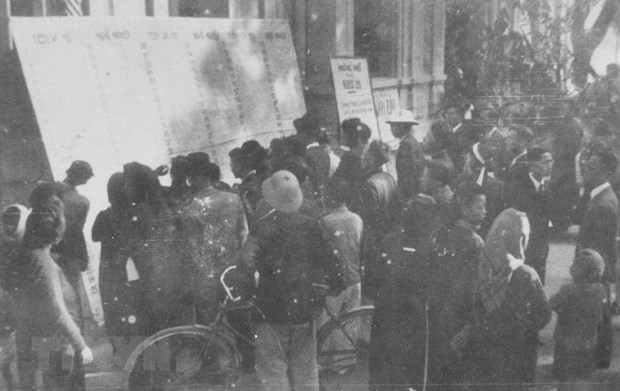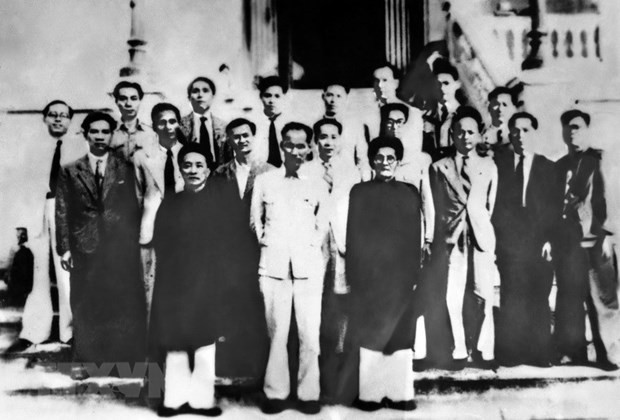(VOVWORLD) - The 1st general election of Vietnam’s National Assembly was held on June 6, 1946, under the principles of democracy, equality, direct universal suffrage, and secrete ballots. The National Assembly chose the government line up and passed a Constitution of the Democratic Republic of Vietnam, the first milestone of Vietnam’s democratic regime.
 Voters read profiles of candidates at the 1st National Assembly election in 1946. Voters read profiles of candidates at the 1st National Assembly election in 1946. (Photo: VNA)
|
Prior to the general election, President Ho Chi Minh said: “General elections constitute an opportunity for the entire population to freely elect people with talents and good virtues to shoulder the nation’s affairs. In the elections, anyone who cares about national affairs can stand for the elections.”
In 1946 when Vietnam was fighting internal hostile forces and foreign invaders, President Ho Chi Minh and Viet Minh, a Vietnamese independence coalition invited all non-Viet Minh people to stand for the election. It showed that the Viet Minh respected people’s freedom and democratic rights, and wanted to rally talented and moral people to shoulder national responsibilities.
The 333 elected National Assembly deputies came from all social strata and parties.
 The government line up of the Democratic Republic of Vietnam elected by the 1st National Assembly during its meeting Oct 28-Nov 9, 1946 (Photo: VNA) The government line up of the Democratic Republic of Vietnam elected by the 1st National Assembly during its meeting Oct 28-Nov 9, 1946 (Photo: VNA) |
Historian Duong Trung Quoc, General Secretary of Vietnam’s Historical Science Association, said that at a time when Vietnam had just declared independence and 90% of its population was illiterate, the country could still hold successful democratic elections.
“General elections on the principle of universal suffrage means all citizens have the right to vote, regardless of their gender, ethnicity, religion, and beliefs. This was not popular everywhere. Even in some European countries, gender equality and women’s right to vote and stand for an election were not popularized,” Quoc said.
The establishment of Vietnam’s National Assembly derived from the needs of the revolution. It was a National Assembly of national independence, national unification, and great unity. It consisted of deputies from the northern, central, and southern regions representing all social strata.
President Ho Chi Minh and the interim government fought resolutely against all hostile forces and reconciled all parties to achieve social stability for the election. The Government Council gave 70 seats in the National Assembly to the National Party of Vietnam and the Revolutionary Party of the New Viet Nam without election.
Associate Professor, People’s Teacher Le Mau Han said: “It was a great policy. It was creativity with principles. The situation forced us to conciliate. It was a difficult National Assembly election.”
General Secretary and Chairman of the National Assembly Office Nguyen Hanh Phuc said the 75th anniversary of the 1st National Assembly general election is an opportunity to review the National Assembly’s accomplishments and identify tasks for the coming elections.
“14 National Assembly elections over the last 75 years have taught us valuable lessons. Our goals are to raise the rate of full-time deputies to 4%, the rate of female deputies to 30%, and raise the number of young and ethnic deputies. We have to ensure democracy in nominations.”
With a strong sense of responsibility to the people and the nation and a motto of “unity, renewal, creativity, and acting for people’s interests and the country’s future, the National Assembly will continue to promote its tradition and successfully fulfill its task as representative of the people.